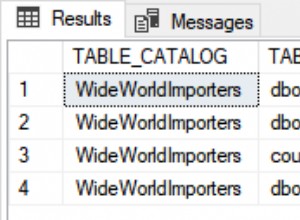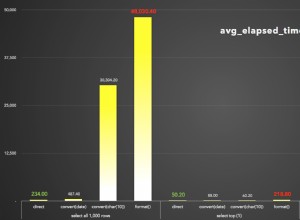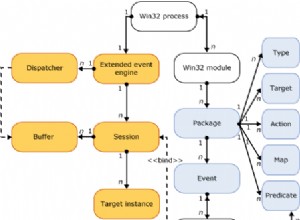Jeśli kiedykolwiek pytałeś sys.identity_columns w SQL Server, będziesz wiedział, że zwraca listę kolumn tożsamości. Zwraca również object_id tabeli, ale nie nazwę tabeli lub jej schemat.
Możesz użyć przykładów kodu w tym artykule, aby zwrócić kolumny tożsamości wraz z odpowiednimi tabelami i schematami.
Przykład 1 – Zwróć wszystkie wyniki
Ten przykład używa sprzężenia z sys.objects aby zwrócić informacje o tabeli i schemacie
USE WideWorldImportersDW; SELECT SCHEMA_NAME(o.schema_id) AS [schema], OBJECT_NAME(ic.object_id) AS [object], o.type_desc, ic.name, ic.seed_value, ic.increment_value, ic.last_value FROM sys.identity_columns ic INNER JOIN sys.objects o ON o.object_id = ic.object_id ORDER BY SCHEMA_NAME(o.schema_id) ASC;
Wynik:
+-------------+---------------------------+----------------+------------------------------+--------------+-------------------+--------------+ | schema | object | type_desc | name | seed_value | increment_value | last_value | |-------------+---------------------------+----------------+------------------------------+--------------+-------------------+--------------| | Fact | Movement | USER_TABLE | Movement Key | 1 | 1 | 236667 | | Fact | Order | USER_TABLE | Order Key | 1 | 1 | 231412 | | Fact | Purchase | USER_TABLE | Purchase Key | 1 | 1 | 8367 | | Fact | Sale | USER_TABLE | Sale Key | 1 | 1 | 228265 | | Fact | Stock Holding | USER_TABLE | Stock Holding Key | 1 | 1 | 227 | | Fact | Transaction | USER_TABLE | Transaction Key | 1 | 1 | 99585 | | Integration | Customer_Staging | USER_TABLE | Customer Staging Key | 1 | 1 | NULL | | Integration | Employee_Staging | USER_TABLE | Employee Staging Key | 1 | 1 | NULL | | Integration | Movement_Staging | USER_TABLE | Movement Staging Key | 1 | 1 | NULL | | Integration | Order_Staging | USER_TABLE | Order Staging Key | 1 | 1 | NULL | | Integration | PaymentMethod_Staging | USER_TABLE | Payment Method Staging Key | 1 | 1 | NULL | | Integration | Purchase_Staging | USER_TABLE | Purchase Staging Key | 1 | 1 | NULL | | Integration | Sale_Staging | USER_TABLE | Sale Staging Key | 1 | 1 | NULL | | Integration | StockHolding_Staging | USER_TABLE | Stock Holding Staging Key | 1 | 1 | NULL | | Integration | StockItem_Staging | USER_TABLE | Stock Item Staging Key | 1 | 1 | NULL | | Integration | Supplier_Staging | USER_TABLE | Supplier Staging Key | 1 | 1 | NULL | | Integration | Transaction_Staging | USER_TABLE | Transaction Staging Key | 1 | 1 | NULL | | Integration | TransactionType_Staging | USER_TABLE | Transaction Type Staging Key | 1 | 1 | NULL | | Integration | City_Staging | USER_TABLE | City Staging Key | 1 | 1 | NULL | | sys | queue_messages_2041058307 | INTERNAL_TABLE | queuing_order | 0 | 1 | NULL | | sys | sqlagent_job_history | INTERNAL_TABLE | instance_id | 1 | 1 | NULL | | sys | sqlagent_jobsteps_logs | INTERNAL_TABLE | log_id | 1 | 1 | NULL | | sys | queue_messages_1977058079 | INTERNAL_TABLE | queuing_order | 0 | 1 | NULL | | sys | queue_messages_2009058193 | INTERNAL_TABLE | queuing_order | 0 | 1 | NULL | +-------------+---------------------------+----------------+------------------------------+--------------+-------------------+--------------+
Przykład 2 – Zwróć tylko tabele użytkowników
W tym przykładzie zastosowano sprzężenie wewnętrzne z sys.tables aby zwrócić tylko kolumny tożsamości z tabel użytkowników.
USE WideWorldImportersDW; SELECT SCHEMA_NAME(t.schema_id) AS [schema], OBJECT_NAME(ic.object_id) AS [table], ic.name, ic.seed_value, ic.increment_value, ic.last_value FROM sys.identity_columns ic INNER JOIN sys.tables t ON t.object_id = ic.object_id ORDER BY SCHEMA_NAME(t.schema_id) ASC;
Wynik:
+-------------+-------------------------+------------------------------+--------------+-------------------+--------------+ | schema | table | name | seed_value | increment_value | last_value | |-------------+-------------------------+------------------------------+--------------+-------------------+--------------| | Fact | Movement | Movement Key | 1 | 1 | 236667 | | Fact | Order | Order Key | 1 | 1 | 231412 | | Fact | Purchase | Purchase Key | 1 | 1 | 8367 | | Fact | Sale | Sale Key | 1 | 1 | 228265 | | Fact | Stock Holding | Stock Holding Key | 1 | 1 | 227 | | Fact | Transaction | Transaction Key | 1 | 1 | 99585 | | Integration | City_Staging | City Staging Key | 1 | 1 | NULL | | Integration | Customer_Staging | Customer Staging Key | 1 | 1 | NULL | | Integration | Employee_Staging | Employee Staging Key | 1 | 1 | NULL | | Integration | Movement_Staging | Movement Staging Key | 1 | 1 | NULL | | Integration | Order_Staging | Order Staging Key | 1 | 1 | NULL | | Integration | PaymentMethod_Staging | Payment Method Staging Key | 1 | 1 | NULL | | Integration | Purchase_Staging | Purchase Staging Key | 1 | 1 | NULL | | Integration | Sale_Staging | Sale Staging Key | 1 | 1 | NULL | | Integration | StockHolding_Staging | Stock Holding Staging Key | 1 | 1 | NULL | | Integration | StockItem_Staging | Stock Item Staging Key | 1 | 1 | NULL | | Integration | Supplier_Staging | Supplier Staging Key | 1 | 1 | NULL | | Integration | Transaction_Staging | Transaction Staging Key | 1 | 1 | NULL | | Integration | TransactionType_Staging | Transaction Type Staging Key | 1 | 1 | NULL | +-------------+-------------------------+------------------------------+--------------+-------------------+--------------+




